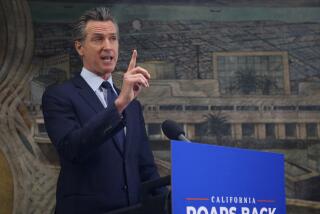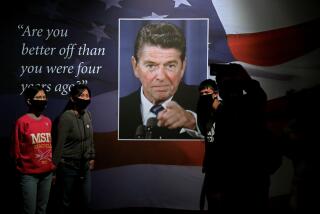A Win for Campaign Finance Won’t Mean Victory for Reform
In the recurring history of crusades to reform the role of money in American politics, the almost-certain victory of Sens. John McCain (R-Ariz.) and Russell D. Feingold (D-Wis.) next week will likely be remembered as a good-sized peak--but not quite a watershed.
McCain and Feingold set out to reduce the influence of big money on Congress. Instead, they succeeded only in outlawing the most egregious form of fund-raising--the unlimited amounts of “soft money” that went into the hands of powerful party barons--in exchange for allowing more “hard money” to flow directly to individual candidates.
The optimists’ version of that bargain runs this way: Hard money is clean, soft money is not. Hard money comes in limited amounts from many individual donors; soft money comes in giant sums that leave candidates beholden to a few fat cats.
But even some reformers are skeptical of that logic. The skeptics include McCain and Feingold, who didn’t intend to promote higher hard-money limits but accepted them as a necessary compromise.
And many of the senators who in key votes this week put the bill on track for expected passage Monday framed the issue in a different light: as a quest not for greater cleanliness but for more autonomy. The rise of soft money, they complained, put them at the mercy of big-time fund-raisers and pesky independent advocacy groups; a return to hard money might give them control of their campaigns again.
Under soft money, “candidates are no longer individuals who have any control over their destiny,” said Sen. Thad Cochran (R-Miss.), whose support for the McCain-Feingold bill was crucial. “They are used like puppets.”
“Most candidates and public officials are mad because they don’t have a voice,” agreed Sen. Bill Frist (R-Tenn.). “It’s not that money is corrupting; it’s that the candidate’s voice is out of his or her control.”
Bipartisan Support Is Result of Uncertainty
Remarkably, it isn’t clear whether the McCain-Feingold bill, if it becomes law, would end up giving one party a significant advantage over the other. That’s one reason for its bipartisan success.
Most experts believe Republicans would benefit more because they have been more successful at raising hard money ($447 million in the last election, compared with the Democrats’ $270 million). By contrast, the Democrats have drawn even with the GOP in the soft-money race ($243 million to the Republicans’ $244 million in the 2000 campaign).
“If you eliminate soft money, it is the Democrats who will lose because the soft money from Hollywood can’t offset the hard dollars raised from small-business owners and professional people,” said former House Speaker Newt Gingrich (R-Ga.). “Up until now, it’s been one Barbra Streisand giving more than 5,000 small businesses that made the difference for the Democrats.”
Other Republicans disagree. “I think Newt is having delusions,” said GOP strategist Eddie Mahe. “This helps the Democrats because the one entity that it doesn’t affect is organized labor,” which through its political activities generally supports Democratic candidates and causes.
That means, Mahe said, that Democrats “don’t need soft money the way we do.”
But one outcome is clear: Abolishing soft money and relying entirely on hard money favors incumbents, no matter what their party. That’s another reason the bill appears likely to pass with bipartisan support.
“This clearly helps all incumbents,” said Sen. Robert F. Bennett (R-Utah). “If you think the present system is incumbency protection . . . look at the mathematics. You can raise hard money twice as fast as before” under the McCain-Feingold bill.
Moreover, during its two-week debate that ended Friday, the Senate tacked on several other incumbent-friendly amendments. These included rules to ensure that television stations live up to agreements to air political ads for lower rates. Another provision added protections for candidates facing millionaire challengers.
“That did a lot to assuage the fears of members on both sides of the aisle,” said a Senate Democratic strategist, who requested anonymity when discussing the issue. “They may not know or care whether this is good for their party, but they know it will make it much harder for challengers to beat incumbents.”
But if these changes have made the McCain-Feingold bill more palatable to many rank-and-file lawmakers, they hardly defused the angst the bill causes among leaders in both parties.
By abolishing soft money, the measure would make it harder for the leaders to demand big contributions from businesses that are subject to federal regulation, a practice some executives have long denounced as “shakedowns.”
This change also would weaken the leverage the leaders enjoy when they control the biggest donations--and decide where it should be channeled.
“The leadership is apoplectic,” said a Republican senator who asked not to be named when discussing colleagues. “They just got defunded.”
The McCain-Feingold bill still has some hurdles to clear before it actually changes the tenor of the nation’s campaigns. After the expected Senate approval, the bill must survive in the House, where Majority Whip Tom DeLay (R-Texas), one of the soft-money kings, has vowed to kill it. Then it must win President Bush’s signature. And it must survive court challenges that Republican leaders are preparing.
But strategists in both parties already are trying to determine how they will run campaigns under the proposed new rules.
“We’re going to have to raise more hard money,” said Jennifer Backus, a spokeswoman for the Democratic National Committee. “Our direct-mail lists are not as good as the Republicans’. . . . But the things you need to do to raise more hard money are things that [DNC Chairman] Terry McAuliffe is doing now.”
Republicans also would have to rebuild their grass-roots organizations, Cochran said. “If we could reach out and organize ordinary voters like we used to, have teams of people working in the neighborhoods, that’s what we’ll have to do to overcome the organizational strengths of the Democrats.”
But skeptics dismiss the idea of a return to the good old days of campaigners knocking on doors. For one thing, hard-money fund-raising now depends mostly on less romantic methods: direct mail and telemarketing run by professional firms.
For another, the proposed rise in the hard-money ceiling--to $37,500 from each donor each year--still means that a public-spirited couple could give their national party and its candidates up to $150,000 during a two-year campaign cycle.
One Loophole Closes, Another Likely Opens
“Candidates will still depend on less than 1% of the wealthiest Americans to win elections,” said Julia Hutchins of the U.S. Public Interest Research Group, which favors public funding of campaigns. “This just reshuffles the money.”
And campaign finance experts are virtually unanimous in predicting that soft money won’t go away entirely, even if it’s outlawed; it will simply find a new loophole through which to flow.
“This is not going to significantly slow the flow of money in elections,” predicted Larry J. Sabato, a political scientist at the University of Virginia. “Within six months the election lawyers on both sides will have found some ways to make certain every dollar now going into soft money is spent in some other way.”
Even after McCain-Feingold, would-be donors could still give money above the hard-money ceiling to independent committees and interest groups like the Sierra Club or the National Rifle Assn.
“It is my firm conviction that within a very short time, someone within a one-mile radius of the Capitol will find a way around this,” agreed Ross K. Baker of Rutgers University. “Washington is a city of magnificent subterfuges.”
More to Read
Get the L.A. Times Politics newsletter
Deeply reported insights into legislation, politics and policy from Sacramento, Washington and beyond. In your inbox three times per week.
You may occasionally receive promotional content from the Los Angeles Times.








